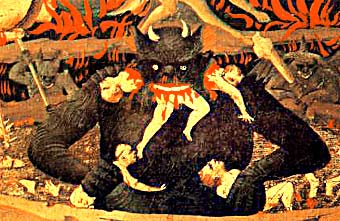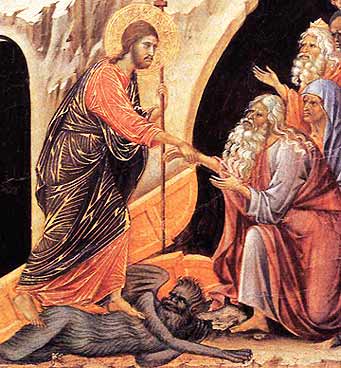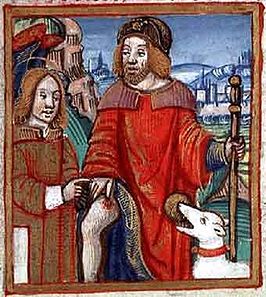The Christian Church was at the center of medieval life. There were two main branches in the West: the Catholic Church based in Rome, and the Orthodox Church based in Constantinople. With its own laws, lands, and taxes, the Catholic Church was a powerful institution. It governed almost every aspect of people's lives, from the practical to the spiritual. Most men and women, rich and poor, were baptized and married in church and attended mass every Sunday of their lives. When they died, their priest read them the last rites, and they were buried on church grounds. For many, life on Earth was hard and short, but the Church stated that if they followed the teachings of Christ, they would at least be rewarded in heaven. This idea gave the Church great power over people's hearts and minds.
Archbishops were powerful men who sat on the king's council and played a leading role in government.
The Church taught that when a person died, the good and bad deeds of their life were literally weighed in the balance by God. Their soul was either carried to heaven by angels or dragged off to hell by demons.
 |
| Last Judgement, this would have been above the door of a cathedral |
Hell was a real and terrifying place for people in medieval times, and its torments were pictured in vivid detail by numerous painters.
 |
| The Last Judgement: Hell (Fra Angelico 1431) |
 |
| Descent to Hell, detail (Duccio, 1308) |
Few people challenged the authority of the Church, but those who did were severely punished. People who disagreed with the Church's teachings were called heretics. They faced being brought to trial in a Church court and, under its special laws, could be condemned to be whipped or burned at the stake. The Cathar sect of southern France rejected the beliefs of the Catholic Church by claiming that everything on Earth was created by the devil. In 1208, the Pope ordered a crusade against them. Over the next 26 years, thousands of Cathars were tortured and burned in huge bonfires until they were completely wiped out.
 |
| This image depicts the eradication of some Cathars. |
Until 1200, books were rare and were usually found only in monastery libraries. Everything was written by hand and monks spent many hours in the "scriptorium" copying out religious texts.
| A monk copying a manuscript in a scriptorium. |
A long manuscript such as the Bible might take a scribe a year to complete. As a way of glorifying God, many manuscripts were beautifully decorated, or illuminated, with jewel-like paints and precious gold leaf. After 1200, books became more common, especially when the first universities opened in Paris and Bologna. Professional scribes and illuminators started producing books as well.
Most people in the Middle Ages hoped to go on a pilgrimage to a holy shrine at some point in their lives. They went for many reasons - proof of their devotion to God, as an act of penance for their sins, or to find a cure for an illness. The holy city of Jerusalem was a favorite destination, as were Rome, where both St. Peter and St. Paul were believed to be buried, and the Canterbury Cathedral in England. On the road, rich and poor traveled together and, for many, pilgrimages were a sort of vacation. To pass the time, people sang songs and hymns, played the pipes, and told stories over their evening meals in roadside taverns.
| Geoffrey Chaucer wrote The Canterbury Tales |
Geoffrey Chaucer's Canterbury Tales was set with this premise: a variety of people going on a pilgrimage telling each other stories.
++++++++++++++++++++++++++++++++++++++++++++++++++++++
Relics
Monasteries collected religious articles. They attracted visitors and were often said to perform miracles. Relics like...
- a tooth of Saint Apollonia, the patron saint of toothache. Hundreds of monasteries had a tooth from her mouth.
| St Apollonia is the patron saint of dentistry |
- fingernail clippings said to belong to St Edmund
- a piece of St Eustace's brain
 |
| St. Eustace head reliquary, c. 1200, made in the Upper Rhineland, on view in "Treasures of Heaven: Saints, Relics and Devotion in Medieval Europe," |
- wood from the manger in which Jesus was born and the cloth that the baby Jesus was wrapped in
- the coals on which St Lawrence was roasted
- one of the stones used to stone St Stephen to death (bloodstained, naturally)
- a piece of the stone on which Jesus stood as he ascended to heaven
- a piece of bread chewed by Jesus
- the head of John the Baptist (Angers and Amiens Cathedrals both had one!)
 |
| Crusaders brought this back to Amiens Cathedral, the supposed head of John the Baptist |
- the crown of thorns placed on Jesus' head at his crucifixion
- a piece of wood from Jesus' cross (thousands of these)
Genuine fakes, but the believers took them seriously. Dead seriously. The monks of Conques stole a saint's body from another monastery!
One saintly monk was terrified to hear that a monastery was planning to kill him and boil his body down so they could have his bones as relics - he changed his mind about visiting them.
Pay as you pray
In 1303 King Philip of France argued with the Italian Pope Boniface about who people should obey - kings or popes. Philip decided the matter by kidnapping 86-year-old Boniface from Rome. The Pope never recovered from the shock and died.
 |
| Pope Boniface VIII |
The next pope was a Frenchman called Clement. Wise Clement decided to stay in France - after all, the Italians might get their own back and kidnap him if he went to Rome.
Once the Pope and his headquarters moved to France they set about cashing in on their power. If you ever become Pope then here are a few measly Middle Ages ways of making money...
1. If you commit a sin (like stealing a penny or pinching the bum of the girl in front of you) then the church can "pardon" you...if you pay.
2. If you want to be important in the church (say, a cardinal because they get to wear a red cloak and you think red suits you) then you can have the job... if you pay.
3. If a church owns some very holy object (like the toe-nail of a saint of the feather from an angel's wing) then you can have it...if you pay.
4. If you give a gift to your local church (maybe money so the church will say prayers after you are dead), the Pope will take a share.
5. The Pope may raise a tax to pay for a Crusade (to fight against the non-Christians in the Holy Land)...you fork out, but he won't actually spend it on a Crusade.
6. If you want to be buried in two places at once (your heart in one place and your body in another, like Richard III) then you can have permission...if you pay.
7. If you want to marry a close relative (like your dead husband's brother) then you can have permission...if you pay.
8. If you are a nun and want to keep two maids (one to do your cleaning and one to do your praying, maybe?) then you can have permission...if you pay.
9. If you want to trade with those 'awful' non-Christian guys from the East (and after all we do want their delicious spices, don't we?) then you can have permission...if you pay.
Potty Plays
The local craftsmen formed themselves into groups called guilds. Around Easter the guilds came together to produce plays for the people - the masses. These plays were based on Bible stories: Miracle Plays and Mystery Plays. That doesn't sound too measly - yet. The guilds performed the plays depending on their own mastery - so they called them mystery plays. Mastery-mystery, geddit?
At first these were performed at the altar of the church - but they became too popular and the churches were full of smelly people. So the plays were moved into the churchyards. But people began trampling on the graves to get a better view. In the end they were taken out of the churches and on to the streets.
The plays were always religious - but that didn't stop them being fun and horribly dangerous! In those days there was no one to give a 'rating' to the plays. Nowadays you know a film is a bit scary if it has a PG rating. In the Middle Ages a lot of the plays were PG - Pretty Gruesome! Which of these horrors could be seen on stage in the Middle Ages?
1. John the Baptist having his head cut off. (true, at the last moment the actor was switched for a dummy. The fake neck was chopped, splitting a bag of ox blood that splashed the audience.)
2. Jesus being crucified. (true, nails through hands was fake but the actor who played Jesus almost died because he was on the cross for like 3 hours!)
3. Jesus rising from the dead and ascending into heaven (or the roof of the stage). (true)
4. The tigers eating the hamsters of Noah's Ark. (false)
5. The donkeys of the Three Wise Men leaving piles of dung droppings on the stage. (true, the 'donkeys' were actors and they pushed piles of manure out from under the tail!)
6. The Roman Emperor Nero slitting open his mother's stomach. (True, fake stomach, but they used pig guts that would spill onto the stage)
7. Adam and Eve appearing naked in the garden of Eden. (false, all the actors were men.)
8. Judas hanging himself from a tree. (true, and the actor almost died because he did it so well!)
In 1326 the people of London turned against the Church because of the taxes it collected. They grabbed a bishop, cut his head off and left his naked body in the street - that was for real; no acting involved!
Batty Beliefs
Medieval people believed that in faraway lands there were...
- forests so high they touched the clouds
- tribes of people with horns who grow old in seven years
- men with the heads of dogs and six toes
- trees that grow wool
-cyclopeans with one eye and one foot who moved faster than the wind (when told to hop)
- 100-meter snakes with jewels for eyes
Miserable Monks
Life was unpleasant for peasants. As the Middle Ages went on, some were able to move from the land to the towns which were starting to grow. After the Black Death the Feudal System began to fall apart. Peasants became free to sell their labor or to move.
In towns they could become craftsmen or traders. They weren't tied to the land by the old Feudal System and some grew rich as merchants. But for others the only way out of the measly miserable life on the land was to join the church. Boys and girls as young as seven could be taken on as monks or nuns.

At first the young trainee monks were called novices - a bit like learner drivers in cars today, they weren't allowed to go out on their own. But it was a very hard life ... even harder than school today! Some of the mini-monks must have had a miserable time...
Dear Mom,
Hope you can get someone in the village to read this to you. The fact is, I want to come home. It's horrible here and I miss your rabbit pies.
It all starts at 2 in the morning. First prayers. That awful bell wakes up, and I have to put on my sandals. I don't have to dress because we sleep in our robes - and they're rotten and itchy. Last night I stumbled into the back of old Brother Benedict. He whipped me with a cane. Have you ever tried praying for two hours with a burning backside?
I got back to bed at 4 and slept 2 hours - on my face, of course - then that bell's ringing again to call us off to Prime service at 6. Brother Benedict breaks the ice on the water trough and makes me wash. He says it will stop me falling asleep. It just freezes my cheeks. Did you know the Benedictine monks pray at least 8 times a day? I asked old Benedict if God wouldn't want us to stop so he could get some sleep. He whipped me - Benedict, that is, not God.
We get breakfast at 7. It's usually porridge. Thin, cold, gritty porridge. Except this morning brother Edward stood on my toe and I cried out. We aren't allowed to make a noise at meals. I was whipped and told I'd eat bread and water for three days. I'd rather have your rabbit pies.
At 8 it's the meeting in the Chapter House - but the novices don't get a word in while the old goats groan on about money and work. It ends with prayers for the dead. But Mom...I don't know anybody that's dead. I sometimes wish I was dead though. Heaven has to be warmer than this place.
After Terce service at 9 we work. It was writing practice in the scriptorium for me. Brother Eamon makes us write on vellum - that's skins taken from the bellies of calves. I wonder why God wants us to do that? This letter's written on the belly of a calf, but I didn't kill it. I can't hold the goose-feather pen in my cold hands. I make smudges and Brother Eamon beats me.
It's High Mass at 11 then off to the fields to work. I had to dig cow much into the soil. The smell would have made me sick, if I'd had any food in my stomach.
I'm almost glad to get indoors for the None service at 3 then it's lessons till Vespers at 6. I had to sit next to Anthony and I argued with him. He gets beaten as hard as me so I didn't feel too bad. Just hungry.
Compline at 7 and I have bread and water while the other monks eat peas with herbs. That tastes worse than bread and water. Every day, peas and herbs, peas and herbs. Sometimes I imagine I have herbs and peas for a change.
At 8 I have a little time to write this before I go to bed and it starts all over again at 2 tomorrow morning. Just let me come home, Mom, and I promise I'll be the best son you've ever had. I'll walk all the way, I'll pay back the gift you gave to the monks when they took me in. Just let me come home Mom. I do miss your rabbit pies. Please, Mom.
Your loving son,
Arthur
Mischievous Monks
The monks can't all have been saints because rules were written down to say what monks must NOT do. So somebody must have done these terrible things or they wouldn't have had the rules! Some of the rules look rather similar to school rules!
A good monk...
- will not think too much of his own comfort
- will not be tempted by rich food
- will not make a noise in the cloister
- will not argue with brother monks
- will not be disorderly in church
- will not be careless
- will not disobey senior monks
- will not become lazy as an old monk
- will not want his own way
- will not think of the world outside
Rules for nuns were very similar. How would you have survived?
St Roch
 |
| St Roch |
People who caught the plague used to call upon the spirit of St Roch for help. Roch caught the plague when he was a young man and went to a wood to die. A dog brought him food and he recovered. When he returned to the town, however, he was suspected of being a spy and thrown into jail where he died. A strange light filled the cell as he died and his captors believed it was a miracle. They decided that if you called for his help then you'd be cured of the plague. On the other hand you may not be cured of the plague! This was not St Roch's fault. This was because God decided you had been too wicked.
St Charles
Charles of Blois (in France) was a saintly man. He...
- never washed his clothes so he carried crawling with lice, put pebbles in his shoes and knotted cords tightly round his body so he suffered pain at all times.
- slept on the straw at the side of his wife's bed.
- made a pilgrimage to a holy place, barefoot in the snow. When his admirers covered the path with blankets he took another road and walked till his feel were frozen and bleeding.
Charles of Blois was a vicious and cruel man. He...
- used large catapults to hurl the heads of dead prisoners into an enemy city.
- massacred 2,000 men, women, and children when he captured a town called Quimper.
Cruelty alongside saintliness. That pretty well sums up the measly Middle Ages.
**This passage was copied almost verbatim out of a fabulous and funny book called The Measly Middle Ages by Terry Dreary

very entertaining thanks
ReplyDeletewhy is this blog just for boys? a woman writes it. lots of girls would be interested, too. you lose half your readership labelling it just for boys.
ReplyDelete